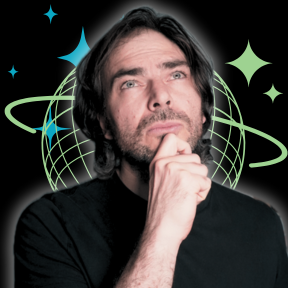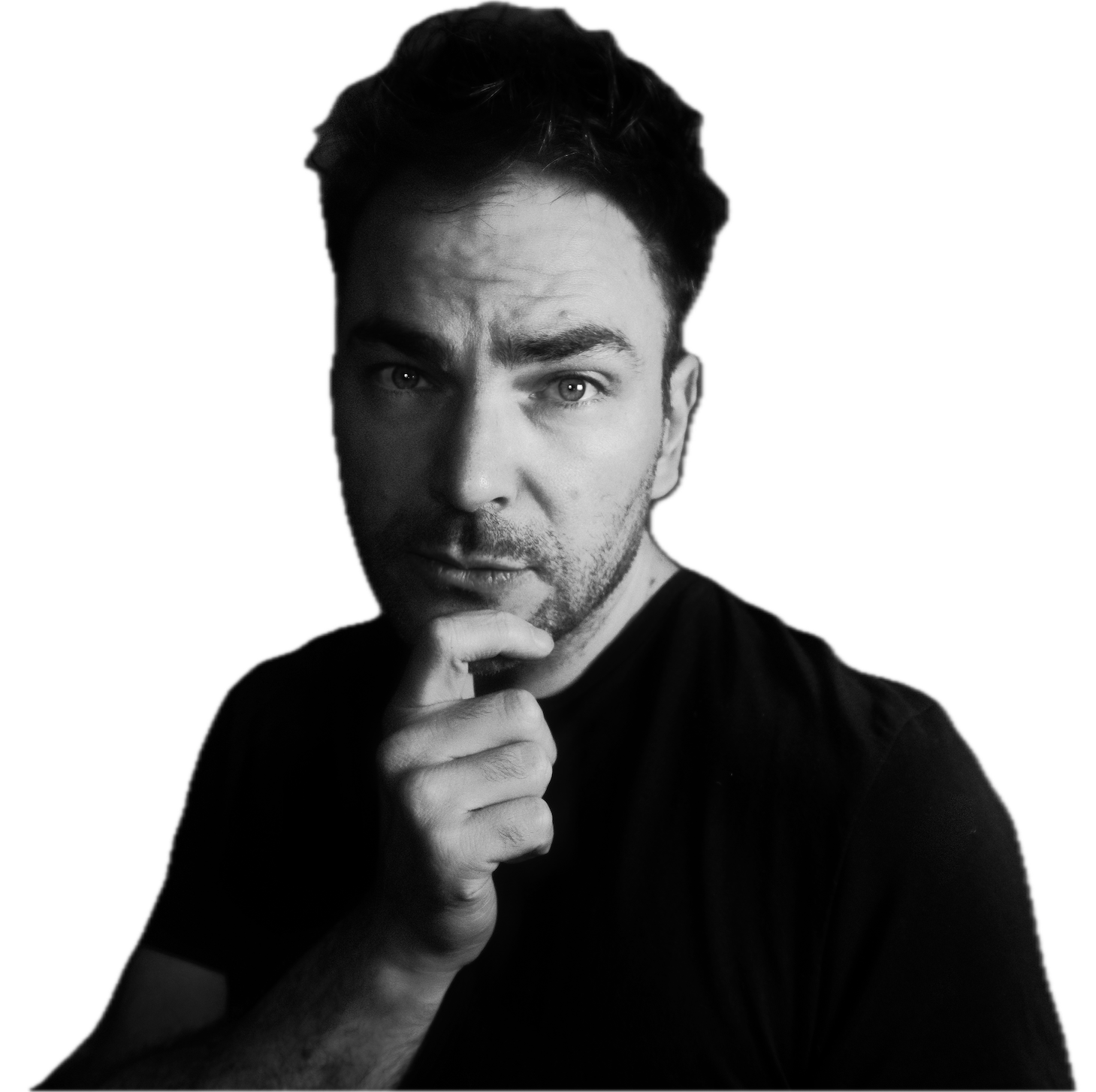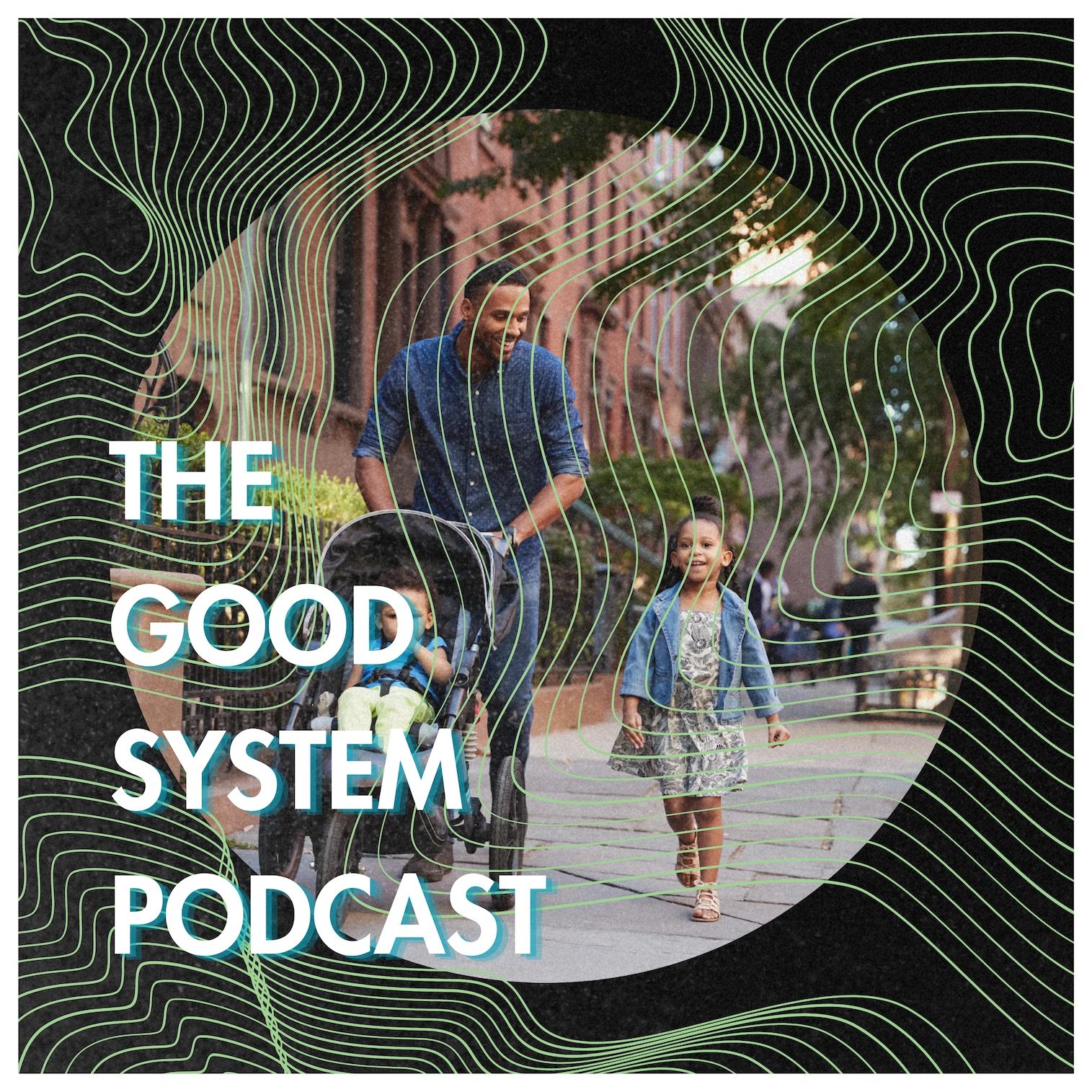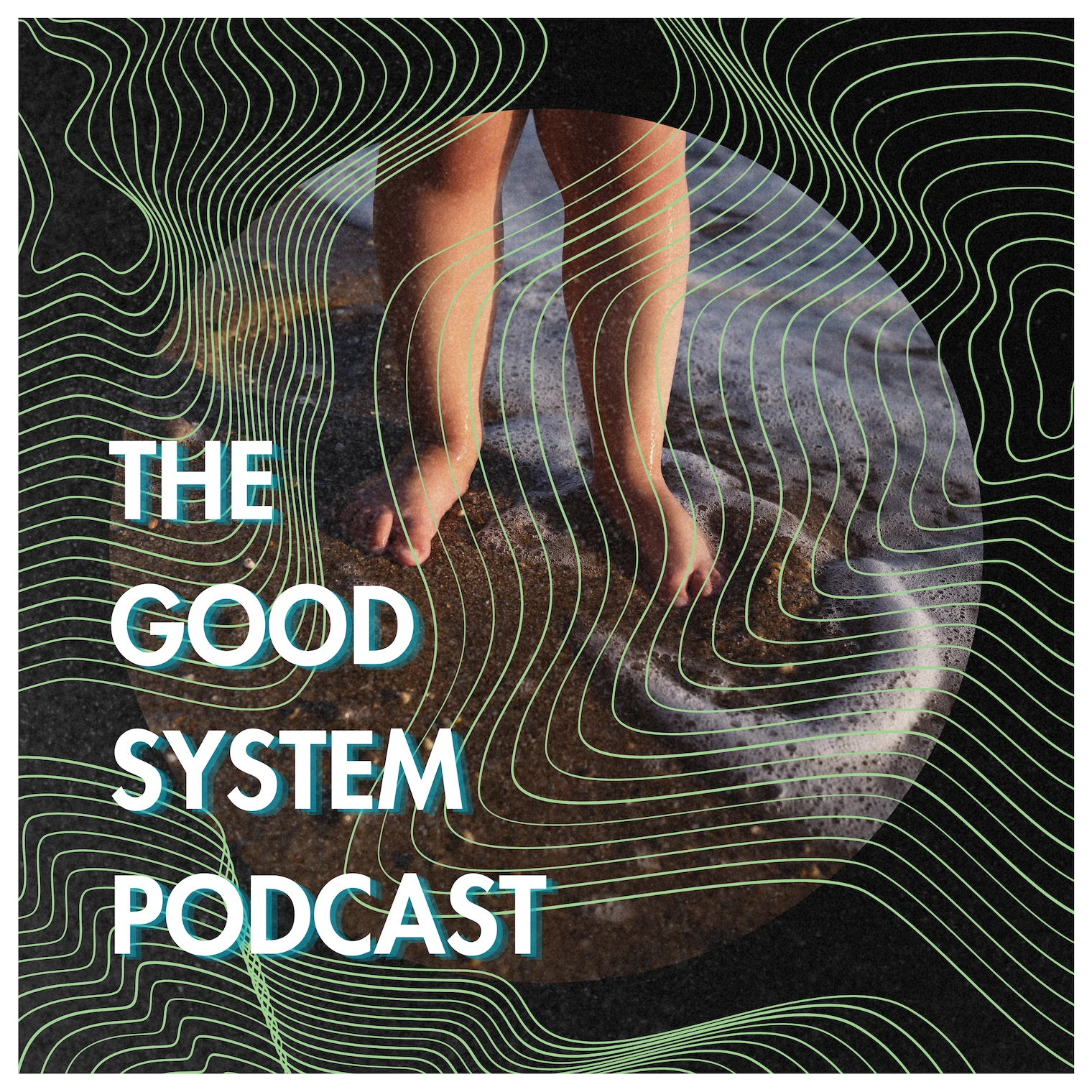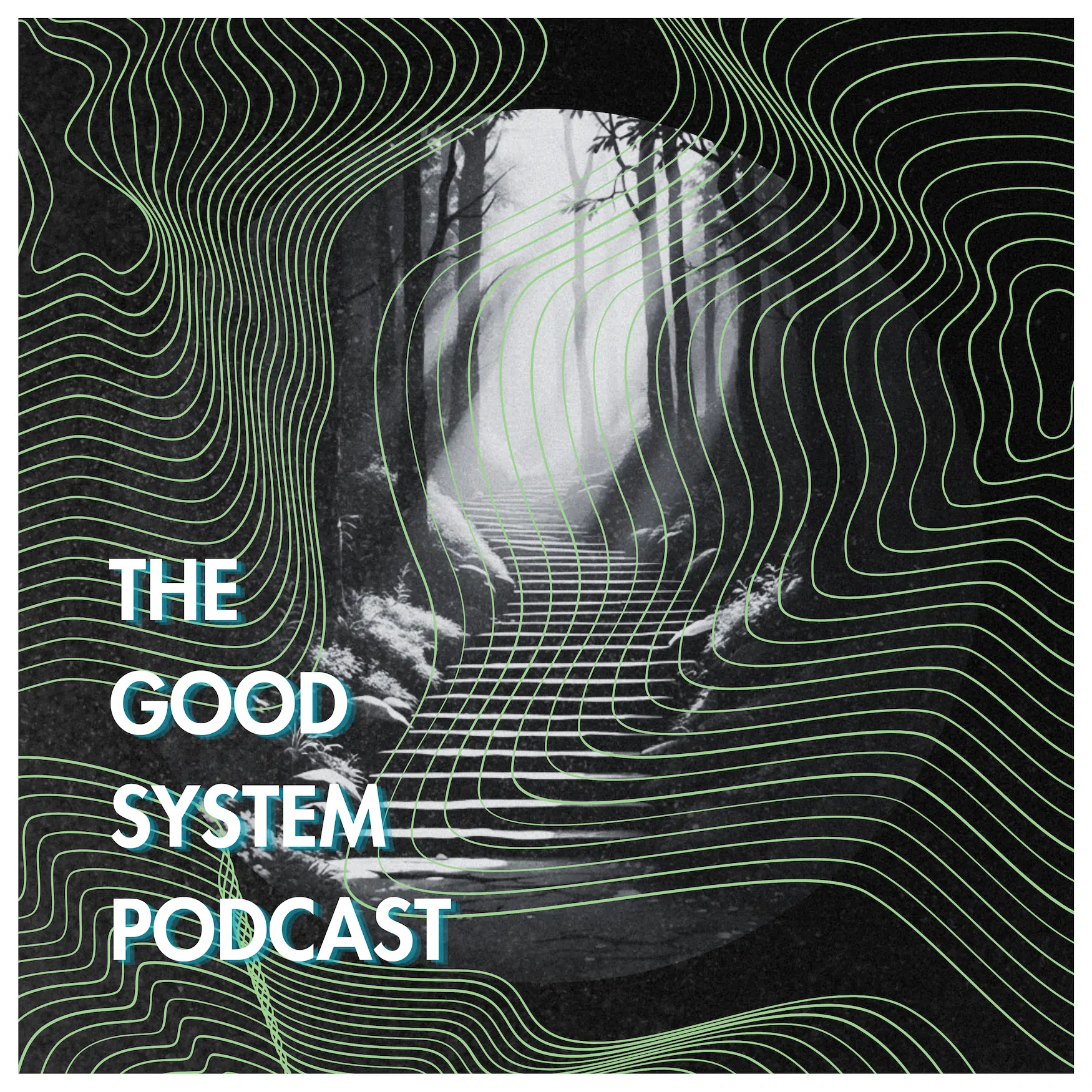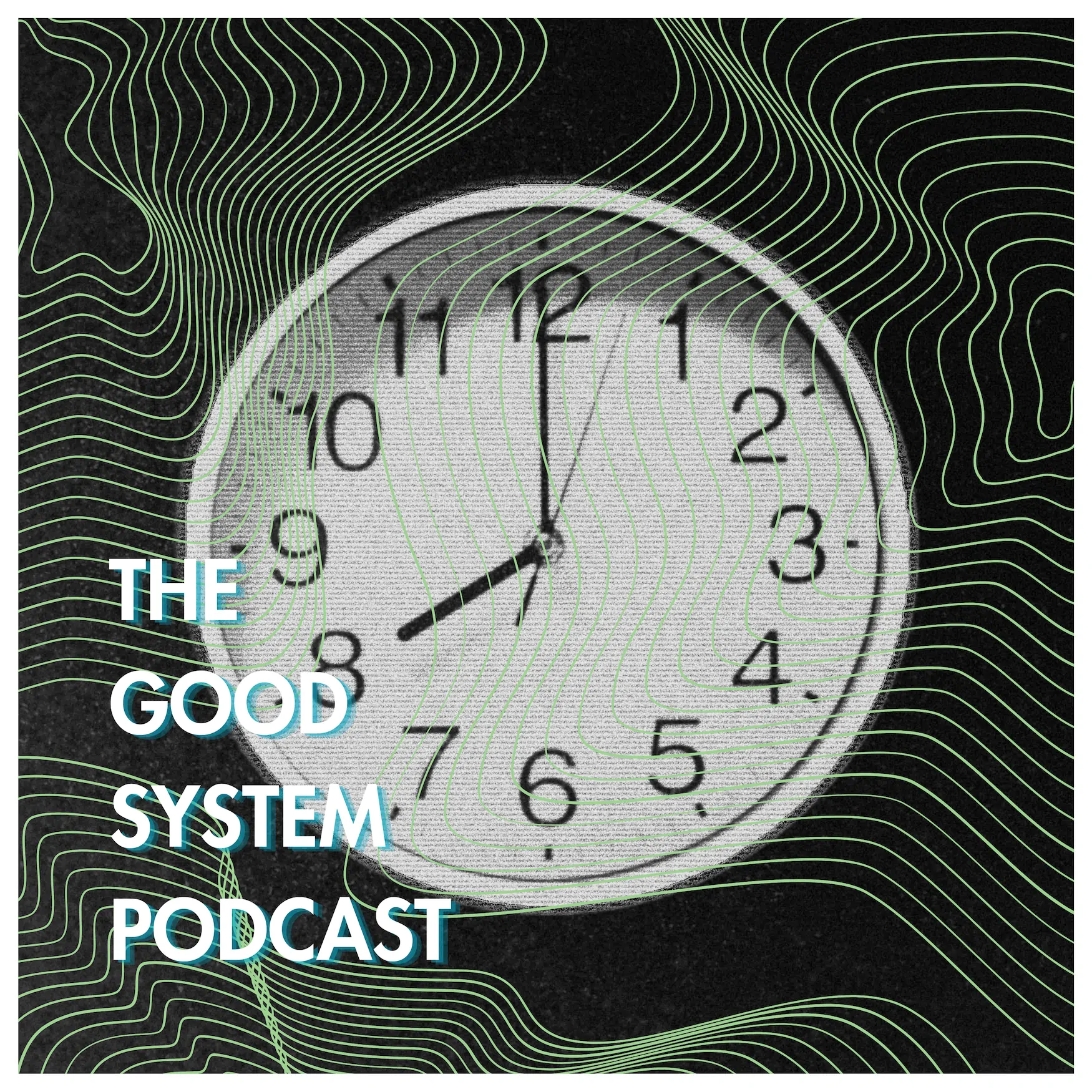[00:00:00] Picture you're stuck behind a Karen in an SUV the size of a small apartment building, honking at a crosswalk because God forbid people are actually walking across the street.
[00:00:17] Meanwhile, you're late for work, your coffee's gone cold, and you're calculating how much of your soul you trade for teleportation powers.
[00:00:28] But here's the plot twist that will blow your urban planning obsessed mind.
[00:00:34] The solution to our city nightmares isn't flying cars or hyperloops. It's something so ridiculously simple, so embarrassingly obvious, that we've somehow convinced ourselves it's impossible.
[00:00:53] What if I told you that the key to fixing our broken cities, our mental health crisis, and our social isolation problem, it's literally putting one foot in front of the other.
[00:01:11] Hello and welcome. I am Ian the Bay, and this is the Good System, the podcast where we built the vision of a good future.
[00:01:22] And holy shit, we've made it to episode 20.
[00:01:27] I can barely believe it myself.
[00:01:32] Now, before we dive into today's confession. Yes, I said confession. I need to come clean about something.
[00:01:42] I've been living a double life. By day, I'm your regular sustainability obsessed system questioning podcast host.
[00:01:52] But by night.
[00:01:54] By night, I'm a walker.
[00:01:58] No, not the zombie kind. Though some drivers seem to think pedestrians are the undead, the way they react to us. I'm talking about someone who has committed the apparently radical act of using their legs for transportation in the year 2025.
[00:02:20] So, picture.
[00:02:22] It's my birthday eight years ago, and my colleague shows up with this gift bag. I'm expecting maybe a bottle of wine or some fancy soap. You know, standard office gift territory. Instead, I pull out this gray T shirt with a graphic of a guy pushing a stroller and the words the Walking Dead.
[00:02:46] D A D, not D, E A D. And the words were written in the classic zombie apocalypse font.
[00:02:56] I'm laughing, thinking this is hilarious and oddly specific, when he. I saw this and immediately thought of you. You're about to become a father and you're such a movie nerd. It's perfect.
[00:03:07] Fast forward. Just a few weeks later, I'm at the birthday party with my family, and my brother shows up with another gift bag. And I swear to you, I pull out the exact same T shirt. Same design, same font, same walking dead text, different color, but basically identical. That's when it hit me. Apparently I'm that guy.
[00:03:33] The walking dad.
[00:03:35] Two completely different people who don't even know each other, saw the same shirt and thought, yep, that's definitely Ian. And you know what? These shirts have become the ultimate conversation starters. I wear one to pick up my kid at kindergarten, and suddenly I'm in deep discussions with other parents that start with the Walking Dead TV show and somehow end up at urban planning and childhood independence.
[00:04:05] But here's the key part. I could only have these conversations because I was walking. If I'd been sitting in a car waiting in the pickup line, none of these connections would have happened.
[00:04:19] It's like wearing a badge that says ask me about walkable cities.
[00:04:25] Though I tell you more about those conversations later in the episode. But here's the thing that really struck me about becoming the official walking dad.
[00:04:36] Walking with kids in the city reveals a whole different layer of urban design problems that you never notice until you're pushing a stroller through what feels like an obstacle course designed by someone who clearly hates families.
[00:04:52] But we'll dive into that particular nightmare later. Trust me, you're going to be horrified by what passes for family friendly infrastructure.
[00:05:04] Today, we are going to explore why walking, this thing humans have been doing for literally millions of years, has become an act of rebellion. And more importantly, how bringing it back could be the secret weapon in building the cities we actually want to live in.
[00:05:23] But first, let me blow your mind with something that sounds like I'm making it up.
[00:05:30] You know what's absolutely bonkers? We live in a world where the most natural form of human transportation has become exotic. Like, when was the last time you met someone who said, oh, I'm a walker, and didn't immediately think they were either a fitness influencer or slightly unhinged?
[00:05:53] I had this revelation last week, and yes, it happened while walking, because apparently I'm that predictable. That walking has become the punk rock of transportation.
[00:06:05] It's countercultural, it's rebellious, it's basically giving the middle finger to a system that wants you strapped into a metal box, isolated from your community, and completely dependent on fossil fuels. But here's where it gets interesting. Walking isn't just good for you. It's an economic power powerhouse that we're completely ignoring. And I mean completely ignoring.
[00:06:34] I'll never forget the day I discovered what I now call the secret park in my neighborhood. I'd been living in the same area for years, walking past this particular block probably hundreds of times.
[00:06:46] But one afternoon, I was walking with my baby in the stroller to get him to sleep. I realized this isn't a normal house entrance. This is a hidden entrance to a park.
[00:07:00] Now, if I'd been driving, yes, there are parents driving their babies to sleep. There's no way I would have spotted it.
[00:07:08] It's literally invisible from a car level. Just looks like another entrance. But walking at human speed, at human height, I could see there was actually a little pathway squeezed between the buildings.
[00:07:24] So naturally, being curious and slightly trespassing inclined, I decided to investigate. I squeezed through this narrow passage and suddenly I emerged into this gorgeous little hidden park, complete with benches, mature trees, even a playground.
[00:07:41] Turns out it's been there for decades. There's even a small plaque indicating it's a legitimate public space, just completely invisible. Unless you're moving slowly enough and at the right angle to notice the entrance.
[00:07:57] But it's not only hidden parks that car drivers can't see, even obvious storefronts are ignored or not recognized. Walkers instead have the best view on these cute little shops. Studies show that pedestrians are shopping ninjas. They stop, they browse, they actually buy things.
[00:08:20] Meanwhile, drivers are basically economic ghosts. They zip past businesses at 50 kilometers per hour, contributing exactly zero euros to local economies. Except when they are desperately searching for parking and cursing the universe. Here is the surprising part, and this is where our story takes a dark turn.
[00:08:44] Walking is dead. And it wasn't an accident. It was murdered.
[00:08:51] Now, before you think I've gone fully conspiracy theorist, hear me out.
[00:08:57] This isn't about shadowy couples or secret meetings.
[00:09:03] It's about something much more insidious. Economic incentives that are completely backwards.
[00:09:11] Think about it.
[00:09:12] Walking doesn't make anyone rich. You can't sell someone a €40,000 walking machine that depreciates 20% the moment they step outside.
[00:09:24] You can't charge monthly subscription fees for sidewalk access.
[00:09:29] Though, knowing our current timeline, some startup is probably working on that right now.
[00:09:37] Working on it triggers me. There's a construction right now on the way to school. The facade of the house next to my son's school is being redone. So far, so good. It really needed it. But now the sidewalk is closed. This means that the children now have to use the opposite side of the road. And to get there, they have to cross an already dangerous junction twice.
[00:10:01] What's more, the other sidewalk is also blocked. The construction company's truck is parked there. It can't be parked on the road, of course, otherwise the cars wouldn't be able to drive. We'd rather put the children in danger.
[00:10:15] Construction sites cannot be avoided. But then it must be ensured that pedestrians can pass safely, especially next to a school. And if the road has to be closed for this, then so be it.
[00:10:28] The icing on the cake is that the summer holidays are just a few days away. If they had just waited a little longer, there wouldn't be so many children on the road.
[00:10:39] This rant leads me to a digression, which is just another word for rant.
[00:10:45] Why do we call sidewalks sidewalks? Seriously, think about the word site walk as if pedestrians are just a sidekick in the grand drama of urban transportation. As if people, actual human beings, are secondary to chunks of metal. The linguistic programming is real people.
[00:11:10] And a conspiracy goes deeper than just semantics.
[00:11:14] Here's a fun fact that'll ruin your day. In many cities, the most dangerous thing is you can't do isn't skydiving or subway surfing, it's crossing the street.
[00:11:27] We've created urban environments so hostile to human beings that parents drive their kids to school not because they're lazy. Well, some are. But because they are generally afraid their children might die walking on infrastructure supposedly designed for them.
[00:11:47] And here's the beautiful these same parents, trying to protect their kids, park on crosswalks and block bike lanes, creating danger for every other child. It's like a recursive nightmare where everyone's trying to solve a problem by making it worse.
[00:12:06] A few months ago, I was crossing the street with my children.
[00:12:10] I carried the younger one in my arm. The older one was a step in front of me. We were on the crosswalk, we had green light.
[00:12:19] Suddenly an SUV reversed into the one way lane. If I hadn't hit the rear window at the last moment, the car would have run my son down.
[00:12:29] Best of all, the driver's wife wanted to call the police because I had allegedly damaged her car. When I agreed that we could call the police and they could then explain to the police why they were reversing into a crossw, they didn't like the idea so much and drove off in forward gear. And they had a child in a car and were driving so recklessly and dangerously like there were no other children.
[00:12:57] But before you lose all hope in humanity, let me tell you there are places where this isn't the case. Places where kids walk to school, where grandparents stroll to markets, where teenagers hang out in public spaces without needing a car to get there. And the secret isn't advanced technology or massive government budgets.
[00:13:23] Enter the 15 Minute City.
[00:13:26] Now, before your uncle starts texting you about the new World order conspiracies, let me explain what this actually means. The 15 minute city is beautifully simple. Everything you need for daily life should be accessible within a 15 minute walk from your home. Groceries, doctor work. That coffee shop where the barista knows your order and shutters. All your life choices. All walkable.
[00:13:52] And this isn't some utopian fantasy. This is how cities worked for literally thousands of years before we decided that the best way to organize human settlements was around the convenience of automobiles.
[00:14:07] I grew up in a small town and then later in the outskirts of Vienna. Both places weren't 15 minute cities.
[00:14:14] You needed a car for most things or you needed to walk a long way.
[00:14:18] And since my parents hadn't a car, it meant I walked a lot.
[00:14:24] Maybe it was a foreshadowing, but now I live in a pretty urban space. Most of the things I need are in walking distance. It is great, but far from perfect.
[00:14:38] To get to the nearest subway station, I have to cross a seven lane road to the next park. It is a four lane road and there are parking spaces everywhere, but no trees that would span shadows.
[00:14:53] But what if I told you that the 15 minute city isn't just better for our health, our environment and our communities?
[00:15:02] What if it's actually the key to human happiness?
[00:15:06] And I'm not being hyperbolic here, there's something magical that happens when you slow down to walking speed. You start noticing things. You make eye contact with neighbors. And yes, this can be a good thing. You see the flowers someone planted in their weird corner lot. You discover that your city has hidden gems everywhere.
[00:15:29] If you're moving slow enough to notice them.
[00:15:32] Walking connects us to our environment in a way that no other form of transportation can. You can't experience the texture of your neighborhood from inside a climate controlled metal box moving at 30 or 50 kilometers per hour.
[00:15:50] But more than that, and this is where things get really interesting. Walking connects us to each other. Every time I take my kid to the kindergarten, I meet a lot of people. Mostly other parents, but also people who came familiar because we meet them nearly every day. Sometimes we have a small talk. And although I hate small talk, I realized how things like this made me feel connected to the place I live. Something I never had before.
[00:16:20] In walkable neighborhoods, kids play outside.
[00:16:24] Elderly people sit on benches and watch the world go by and yell at clouds. Or teenagers who congregate in public spaces.
[00:16:34] Community happens naturally because people are actually present in public space, not just passing through it.
[00:16:44] And this brings us to our final question. If walking is so obviously beneficial, why does it feel like an uphill battle to make it happen?
[00:16:57] Here's the uncomfortable Our cities weren't designed by accident.
[00:17:03] Every six lane road, every parking minimum, every suburban sprawl development was the result of conscious choices made by people in positions of power and those choices were influenced by a very specific set of economic incentives that had nothing to do with human happiness or community well being.
[00:17:26] The car industry, the oil industry, the suburban development industry, they all benefit from cities designed around automobile dependency.
[00:17:35] There is no comparable lobby for sidewalks and crosswalks.
[00:17:40] There is a major street in my neighborhood that gets remodeled. It could have been completely pedestrianized, but since the shop owners were afraid that they would lose all the customers, it will be a one way street.
[00:17:55] They were completely ignoring the fact that only very few customers come with the car, but they used their lobbying power and the cowardly government to make a bad decision.
[00:18:09] The street will be better than it is now, but it could have been so much better for the people if money wouldn't make the world go round.
[00:18:19] But here's where our story takes a hopeful turn because this is the good system, not the complain about everything system.
[00:18:29] Change is happening. Cities around the world are remembering that they're supposed to be designed for people, not cars.
[00:18:38] Paris is removing parking spaces and adding bike lanes. Barcelona has superblocks where cars are restricted and public space is prioritized in. Even car obsessed American cities are starting to experiment with car free zones and walkable developments. And the secret weapon in all of this? It's not top down policy change though, that helps. It's people like us choosing to walk when we can, supporting businesses in walkable areas and showing our cities what we actually want. I'm part of an advocacy group that tries to build a giant car free park on an unused railroad facility.
[00:19:21] At first people laughed and thought what a ridiculous idea. But now the reigning party provided how they imagine the park. It is of course worse than the original idea since it is mainly concrete. But they can't ignore the fact that people want a park and we will fight that it will be a real one. Not only a garage with a green roof, but making walking cool again. And yes, I am using that phrase unironically.
[00:19:51] It requires more than just individual choice.
[00:19:55] We need to hack the culture. Walking needs better pr. Think about it. Cycling has this whole aesthetic. Cyclists have cool gear, Instagram worthy bikes, communities that make beautiful videos. Meanwhile, walking has comfortable shoes and the occasional fitness app that guilt trips you about. Step counts.
[00:20:18] We need to make walking sexy. We need walking influencers. We need apps that gamify urban exploration, not just step counting.
[00:20:30] When I was bringing my kid to kindergarten lately, she made me wear her hat because suddenly it wasn't what she wanted to wear anymore. Other people smiled and made compliments seeing me wearing A child hat formed like a cat.
[00:20:44] Something like this would have never happened if I were driving a car. Or the bag of gummy bears that got spread on the ground. Yes, littering is bad. I hate all the garbage, but the sun shining through the sugar and starch in all the different colors was beautiful. I posted a picture on my Instagram if you want to see it. The link is in the description.
[00:21:06] These are the stories we need to tell that help people imagine a different way of living. Like, don't eat gummy bears. Spread them out on the ground. It's healthier. No, but for real, please don't litter. It sucks.
[00:21:25] You wake up in a city where your 8 year old can walk to school safely. Where your grandparents can stroll to the market without fear. Where teenagers have places to hang out that aren't parking lots or malls.
[00:21:44] A city where the streets are full of life instead of just traffic. Where you know your neighbors because you actually see them outside.
[00:21:54] Where local businesses thrive because people are walking past them every day.
[00:22:01] A city where you don't need to own a car to have freedom. Where freedom comes from being able to walk out your door and access everything you need under your own power.
[00:22:14] This isn't utopian fantasy. This is how most successful cities throughout human history have worked. We are not inventing something new. We are remembering something we forgot.
[00:22:29] When I imagine, I go out the door and instead of cars I see trees or maybe people even. It would be such a better quality of life. It would be cooler, more silent, more beautiful.
[00:22:44] And I wouldn't have to go to the groceries anymore. I could send my kids. That maybe would be even the best thing. If I make the streets beautiful and safe, I wouldn't have to go outside anymore.
[00:23:00] So here's my challenge to you this week.
[00:23:04] Walk somewhere you would normally drive.
[00:23:08] Not because you have to, but because you want to see what you're missing. Pay attention to what you notice. The conversations you overhear, the buildings you actually see for the first time, the neighbors you might meet. And then ask yourself what would have to change in your city to make that walk feel safe, pleasant and convenient for everyone.
[00:23:36] Because that's how we build the good system. Not through grand gestures or revolutionary changes, but through the simple act of putting one foot in front of the other and imagining what's possible.
[00:23:50] It's like when babies learn to walk. It's a long process full of failure. But when they are finally putting one foot in front of the other completely by themselves, it's the best day in their life. They are more independent, they see more, and they can explore the whole world.
[00:24:11] And it's good for the parents too, because they don't have to carry them all the time.
[00:24:19] So that's episode 20 of the Good System.
[00:24:26] I can't believe we've made it this far, and I especially want to thank everyone who's been listening since the beginning.
[00:24:36] You know who you are, and you're the reason this little podcast exists.
[00:24:43] Thank you.
[00:24:46] Walking might seem like a small thing, but small things compound.
[00:24:52] Every step we take toward more walkable cities is a step toward communities that actually work for human beings.
[00:25:03] If today's episode got you thinking, I'd love to hear about it.
[00:25:09] You can find more of my thoughts on walkable cities, sustainable systems, and the vision of a better future on my
[email protected] I'm also on YouTube where I post videos about nearly the same topics, but in a lighter, shorter way and maybe through another perspective. And if you want to stay connected and get these ideas delivered directly to your inbox, sign up up for my newsletter. I promise it's more interesting than your average urban planning content, mainly because I include way too many jokes about sidewalks.
[00:25:50] You find all the links in the show notes or on my blog. Check it out. Thank you for listening. Till next time. Keep walking, keep questioning, and keep building the good cistern I am Ian the Bay.
